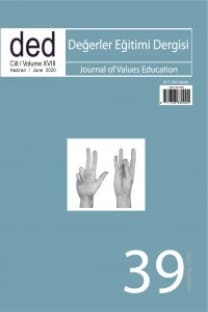Bilgi Kapılarını Açmak
Modern bilinç gittikçe artan oranda tek yönlü olarak saldırıya uğramakta ve savunulmaktadır. Modern bilinç gittikçe artan bir şekilde ?her ikisi de genellikle tek boyutlu olmak kaydıyla? saldırıya uğramakta ve savunulmaktadır. Aslında modern bilinç insanoğlu için bir çok olumsuzluk sonuç içermekle birlikte önemli yararlı etkilere de sahiptir. Ayrıca gerçekleşmemiş, ama büyük ölçüde olumlu bir çok potansiyele de sahiptir. Eğer modern bilincin olumsuz yönlerini yenmek ve olumlu potansiyellerini gerçekleştirmek istiyorsak, tarzımızı temelden dönüştürmemiz gerekmektedir. Bu makale, bilgi hakkındaki dominant modern varsayımların olumsuz sonuçlarını incelemekte ve bilgi yoll arımızın olumsuzluğun ötesine aktarılması, modern bilincin, olumlu yönlerini gerçekleştirecek şekilde temelden dönüştürülmesi için neler yapılması gerektiğini ele almaktadır.
Anahtar Kelimeler:
Bilgi, Bilmek, Bilme Yollar›, Modern Varsay›mlar, fiuurun Tekamülü.
Opening the Gates of Knowledge
Modern consciousness has been increasingly attacked and defended,
both often in one-sided ways. Modern consciousness has, indeed, had
many negative consequences for the human being, and, paradoxically, at the
same time, profound beneficial effects, and contains unrealized, but far-reaching,
positive potentials. A fundamental transformation of our ways of knowing
is required if the negative aspects of modern consciousness are to be overcome
and the positive potentials to be realized. This article examines the negative
consequences of dominant modern assumptions about knowing, and
what would be required for a fundamental transformation of our ways of
knowing that would move beyond the negative and toward the realization of
the positive aspects of modern consciousness.
Keywords:
Knowledge, Epistemology, Modern Assumptions, Evolution of Consciousness.,
___
Barfield, O. (1944). Romanticism comes of age. (1986, 2.nd ed.). Middletown, Conn: Wesleyan University Press.Barfield, O. (1944b). Of the consciousness soul. Barfield, O. ed. In Romanticism comes of age (pp.126-143). London: Anthroposophical Pub. Co.
Barfield, O. (1965). Saving the appearances: A study in idolatry. New York: Harcourt, Brace, & World.
Barfield, O. (1967). Speakers meaning. Letchworth, England: Rudolf Steiner Press.
Barfield, O. (1971). What coleridge thought. Middletown, Conn: Wesleyan University Press.
Barfield, O. (1977). Science and quality, in barfield, The Rediscovery of Meaning and Other Essays. Middletown, Conn. : Wesleyan University Press.
Barfield, O. (1979). Habit, guilt, and history. Middletown, Conn: Wesleyan University Press.
Barfield, O. (1985). History in English words. Edinburgh: Floris Books.
Berdyaev, N. (1949). The meaning of history. London: G. Bles.
Berdyaev, N. (1952). The realm of spirit and the realm of caesar. London: Victor Gollanez, Inc.
Bohm, D. (1976). Imagination, fancy, insight, and reason in the process of thought. S. Sugerman (Ed.), in Evolution of Consciousness. Middletown, Conn: Wesleyan University Press.
Bohm, D. (1980). On insight and its significance for science, education and values. D Sloan (Ed.), In Education and human values. New York: Teachers College Press.
Bohm, D. (1981). Insight, knowledge, science and human values. In Teachers College Record, 80.
Chargaff, E. (1978). Heracletian fire: Sketches from a life before nature. Lanham, Md.: University of America.
Cobb, J. (1962). Living options in protestant theology: A survey of methods. Philadelphia: The Westminster Press.
Cobb, J. (1967). The structure of christian existence. Philadelphia: The Westminster Press.
Crick, F. (1994). That astonishing hypothesis: The scientific search for the soul. New York: Scribners
Ellul, J. (1978). The betrayal of the west. New York: Seabury.
Gebser, J. (1985). The origins of consciousness in the breakdown of the becameral mind. Boston: Houghton Mifflin.
Griffin, D. R. (1988). Introduction: The reenchantment of science In The reenchantmentof science: Post modern proposals (pp: 1-46). Albany: State University of New York Press.
Jaspers, K. (1953). The origin and goal of history. New Haven: Yale University Press.
Jaynes, J. (1976). The origin of consciousness in the breakdown of the bicameral mind. Boston: Houghton Mifflin.
Kühlewind, G. (1988). From normal to healthy: Paths to the liberation of consciousness. Great Barrington, Massachusetts: Lindisfarne Press.
Lehrs, E. (n. d.). Man or matter. New York: Harper & Brothers.
Lukacs, J. (1986). Outgrowing democracy. Lanham, Md: University of America.
McDermott, R. (Ed.). (1984). The essential steiner: Basic writings of rudolf steiner. San Francisco: Harper & Row.
Niebuhr, H. R. (1978, c. 1963), The Responsible Self: An Essay in Christian Moral Philosophy. New York:Harper & Row.
Prickett, S. (1986). Words and the word: Language, poetics and biblical interpretation. Cambridge: Cambridge University Press.
Rhodes, R. (1986). The making of the atomic bomb. New York: Simon and Schuster.
Smith, H. (1979). Excluded knowledge: A critique of the modern western mind-set. Teachers College Record, 80.
Smith, H. (1989). Beyond the post-modern mind. New York: The Crossroads Publishing Company .
Steiner, R. (1947). Knowledge of the higher worlds and its attainment. Hudson, N.Y: Anthroposophic Press.
Steiner, R. (1999). The philosophy of freedom: The basis for a modern world conception. (Original Publication, 1894.). London: Rudolf Steiner Press.
- ISSN: 1303-880X
- Yayın Aralığı: Yılda 2 Sayı
- Başlangıç: 2003
- Yayıncı: Ensar Neşriyat Ticaret A.Ş.
Sayıdaki Diğer Makaleler
Asım Yapıcı, Zeki Salih Zengin
Yetişkinlere Göre Yetişkin Din Eğitimi
Eğitim Tarihimizde Okuma Toplantılarının Yeri ve Okunan Kitaplar
Fen Eğitiminin Amaçlarında Değişen Değerler: Fen - Teknoloji - Toplum
Salih ÇEPNİ, Ahmet BACANAK, Mehmet KÜÇÜK
Üniversite Kültüründe Önemli Bir Unsur: Değerler
İslâm Dünyası'nın Duraklama Sebebleri Üzerine Ünlü İlimler Tarihçisi Fuat Sezgin'i Dinlemek
